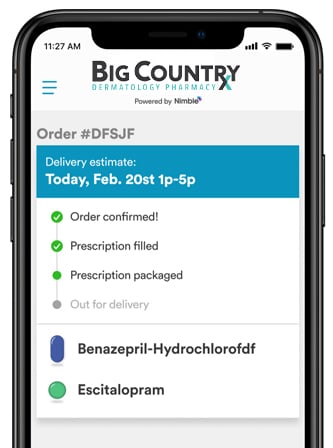Accutane is the go-to-solution for people who are dealing with severe acne when other forms of acne treatment don’t work. It is extremely effective at treating severe acne, however patients do have to be aware of the potential side-effects associated with using it. These concerns are fueled by certain studies linking its use to many possible side effects including depression and organ damage.
While these concerns are warranted when taking Accutane or Isotretinoin for treatment. Fortunately, there are precautions you can take to reduce the risk of these side-effects from occurring.
Concerns With Accutane
Many patient’s concerns with Accutane are the possible risks associated with its use. However, it's important to note that many of these symptoms tend to go away over time and don’t require prompt urgent attention. If the side effects refuse to go away, then you should seek out medical attention from your doctor. Because most dermatologist see Accutane patients once monthly, this is usually not an issue.
Potential Side Effects
These are some of the more common side effects you may experience when taking Accutane (Isotretinoin).
- Dry skin, mouth, eyes, or nose
- Red, sore and cracked lips
- Nosebleeds
- Peeling skin, usually on the soles and palms
- Joint and muscle pain: If you intend to participate in any hard physical activity as you treat your acne with Accutane, make sure you inform your doctor. This is because it can lead to pain in your joints, bones, ligaments, and muscles. In addition, it can affect the growth of long bones in teenagers, and such effects may be permanent.
- Temporary thinning of hair
You may experience one or more of these side effects while using Accutane. Try not to worry if you start experiencing any of them as they tend to go away over time. If they last for an extended period of time, take the appropriate precautions and get in touch with your dermatologist.
Serious Side Effects
There are more serious potential side effects of using Accutane that can cause long-term and permanent havoc on the body. Nevertheless, it is essential to know that these severe side effects manifest very rarely. Some of them include the following:
- Headache, chest pain, stomach pain
- Vision issues
- Dizziness
- Seizures
- Nausea and vomiting
- Impaired wound healing
- Muscle weakness
- Difficulty hearing or ringing in the ears
- Painful or constant dryness of the eyes
- Fainting
- Fast or pounding heartbeat
- Organ damage
Accutane can rarely cause damage to some organs, which is probably the most fear-inducing side effect possible. The organs that can be damaged include the liver, intestines, pancreas as well as the esophagus. The chances of this side effect appearing are very low, and again there are warning signs that your provider is going to be looking for at each of your monthly visits to prevent these serious long term side effects from occurring.
The following symptoms may mean some of your organs have been damaged.
- Difficulty swallowing or pain when swallowing
- Bleeding from the rectum; diarrhea
- Yellowing of the skin or the whites of the eyes
- Jaundice
- Dark urine
Of course, you may experience some of these serious side effects and in fact they are actually not from taking Accutane, and instead are from some other cause. Contact your doctor if you are experiencing any of these side effects mentioned here. Your provider treats you as an individual patient, we are merely talking in generalities here.
Take Precautions
To reduce the risk of experiencing or developing any of these side effects when using Accutane, you can follow certain precautions.
-
Know Your Allergies
Accutane can contain soybeans and parabens which can trigger allergic reactions in certain individuals. Be sure to let your provider know if you have any allergies to avoid potential allergic reactions.
-
Discuss Your Medical History With a Doctor/Pharmacist
Discussing your medical history with your doctor and pharmacist is important so they can determine if Accutane is safe for you to use. This is especially important if you have certain conditions such as diabetes, a personal/family history of high triglycerides (high blood fats), mental or mood issues like depression, liver disease, eating disorders, obesity, alcohol abuse, bone loss conditions, pancreatitis or any other pre-existing health conditions.
-
Avoid Blood Donations
You should avoid donating blood for about a month after your last dose of Accutane as your blood can cause birth defects in pregnant women who receive your blood.
-
Limit Your Sun Exposure
Whenever you are on Accutane, your skin will become more sensitive to the sun. If you do decide to go outside, make sure to apply sunscreen and wear protective clothing.
-
Avoid Skin-Smoothening Cosmetic Procedures
If you are using Accutane, avoid skin-smoothening cosmetic procedures like laser, waxing, and dermabrasion for at least 6 months after the therapy. Failure to do this can scar your skin. In the same vein, stay away from alcohol if you are taking the medication as it may increase the risk of some severe side effects.
-
Avoiding Usage During Pregnancy:
Accutane (Isotretinoin) should not be used by pregnant women or those that may become pregnant in the course of treatment. If you unexpectedly become pregnant during treatment, talk to your doctor about it as soon as possible. This will typically be addressed by filling out a questionnaire for the iPledge program each month that you are on the medication.
There are more than a few potential side effects associated with taking Accutane, but don't let them dissuade you from taking it for treatment. With the proper precautions and medical guidance, you can decrease the risk of experiencing these side effects. Not to mention this is the only known medication to actually have long term curing affects for sever acne compared with most medications that only treat it while you continue taking the medication.



